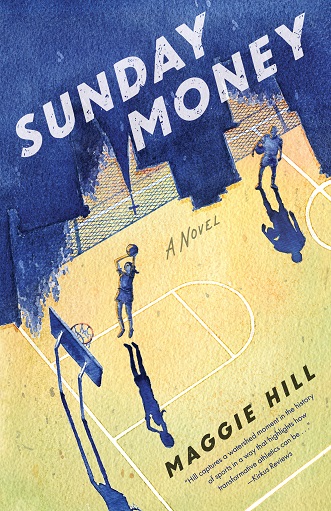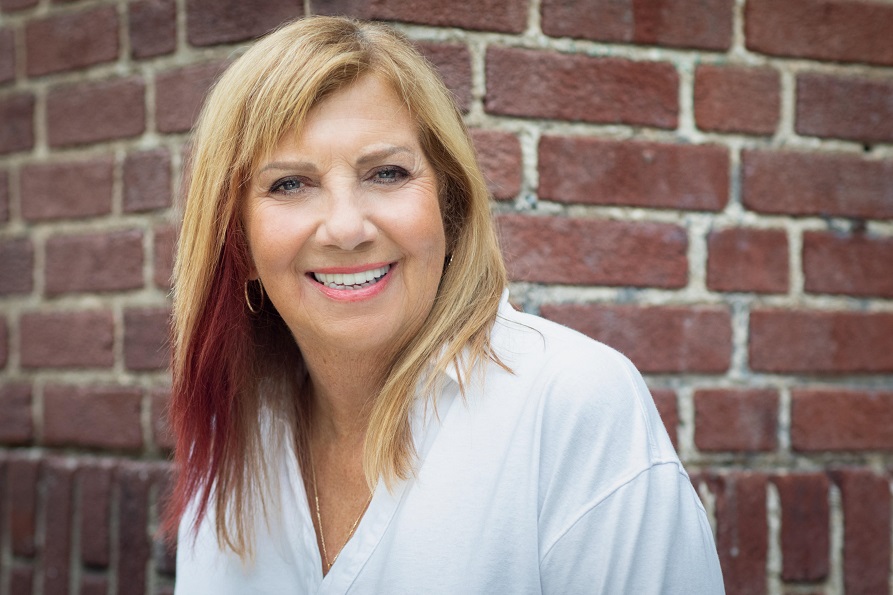Here’s the thing: like all fiction, the literary perceptions and insights are based on experience. All names, characters, places, incidents are either products of my imagination, or are used fictitiously.
Maggie Hill – 20 May 2024
The Back Flap
It’s 1971, but for Claire Joyce and girls’ basketball, it might as well be 1871. Stilted rules (three-bounce dribbling, two roving players for full-court games, and uniforms that include bloomers) set their play unfairly apart from the boys’ basketball Claire’s older brother John has trained her in.
Basketball is the only constant in Claire life, and as she enters her teen years the skills she’s cultivated on the court—passing, shooting, and faking—help her guard against the chaos of an alcoholic mother, an increasingly violent younger brother, and the downward spiral her beloved John soon finds himself unable to climb out of. Deeply cut from the cloth of the Catholic Church, Brooklyn’s working class, and the limited expectations her world has for girls, Claire strives to find a mirror that might reflect a different, future self. Then Title IX bounces on the scene. Suddenly, girls’ basketball becomes explosive, musical, passionate, and driven—and if Claire plays it just right, it just might offer a full ride to a previously out-of-reach college.
Sunday Money follows Claire as she narrates her way through 1970s Brooklyn, hustling on and off the court and striving to break free of the turmoil in her home and the rulebook “good” girls are supposed to follow.
About the book
What is the book about?
Sunday Money is a coming of age story set in 1970’s Brooklyn. The novel follows Claire as she navigates her way through a changing world, on and off the basketball court, striving to break free of the turmoil in her home and the rulebook good Catholic girls are supposed to follow.
When did you start writing the book?
I started writing the book in earnest, after playing around with a basketball story, in 2015.
How long did it take you to write it?
Probably a little more than four years, dedicated. But I was thinking about it for a long time.
Where did you get the idea from?
I watched a WNBA game and thought those players were such badasses. I realized that women’s basketball was a full-on, magical, driven game now – unlike when I was coming up.
Were there any parts of the book where you struggled?
Yes! I wanted to steer it one way, but the life of the narrator kept driving it another way.
What came easily?
Immersing in the basketball. Absolutely.
Are your characters entirely fictitious or have you borrowed from real world people you know?
Here’s the thing: like all fiction, the literary perceptions and insights are based on experience. All names, characters, places, incidents are either products of my imagination, or are used fictitiously.
We all know how important it is for writers to read. Are there any particular authors that have influenced how you write and, if so, how have they influenced you?
Toni Morrison, Flannery O’Connor, Raymond Carver, Colum McCann, Michael Cunningham…really, any moment in a piece that clutches at my heart, that writer is my hero forever. The writers I’ve mentioned have, at some point in their stories, taken my breath away. Each of them is inclusive of the reader, never pushing them away.
Do you have a target reader?
Even though some of my most enthusiastic readers are the men who’ve read it, I think young girls and women will really find a lot to relate to here.
About Writing
Do you have a writing process? If so can you please describe it?
Yes, I show up. That can really be hard to do! Just show up. A lot. Commit. Be in the game. Pretty much, that’s the process.
Do you outline? If so, do you do so extensively or just chapter headings and a couple of sentences?
I don’t outline, but I am finding that having an arc, or a reverse outline is really helpful to write towards.
Do you edit as you go or wait until you’ve finished?
The line edit thing happens on a word-by-word basis; like, if I’m not happy with a word, I have to change it right then and there. Bigger edits wait until the finish, which is usually about structure or sequence.
Do you listen to music while you write? If yes, what gets the fingers tapping?
I do! For Sunday Money, it was a lot of Marvin Gaye and Sly & the Family Stone in keeping with the time period. The music selection is on my website. But for this next book, I’m all Leonard Cohen, all the time.
About Publishing
Did you submit your work to Agents?
I did submit to agents and found them to be extremely hard working, mostly generous people. They were usually courteous and wrote some nice rejection letters!
What made you decide to go Indie, whether self-publishing or with an indie publisher? Was it a particular event or a gradual process?
I had been on the rounds of submission when I learned about She Writes. I did some research and liked what I learned. I liked that they had a low acceptance rate, and I liked the whole idea of greenlighting your own work, as Brooke Warner advises.
Do you have a marketing plan for the book or are you just winging it?
Plan, and some winging – wouldn’t be fun without that.
Any advice that you would like to give to other newbies considering becoming Indie authors?
Yes, welcome! You’re not alone. There are good places out there. Do the work.
About You
Where did you grow up?
I grew up in Brooklyn, New York.
Where do you live now?
Rockaway Beach, New York.
What would you like readers to know about you?
I’m so grateful to readers of the book. Truly. Thank you.
What are you working on now?
A serial killer novel that’s even scaring ME. Stay tuned.
End of Interview:
Get your copy of Sunday Money from Amazon US or Amazon UK.


